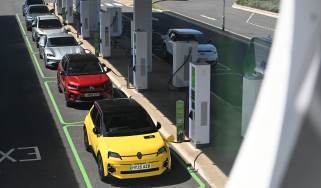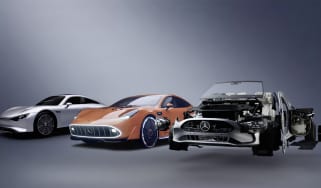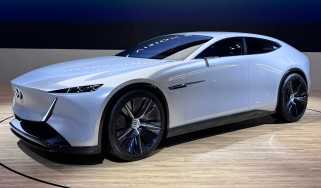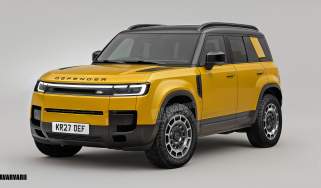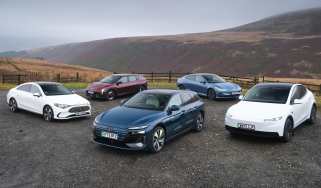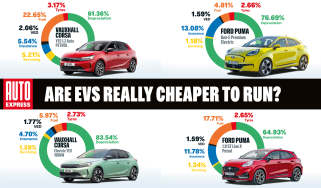Car carbon footprints: does the carbon neutral car exist?
What is a carbon-neutral car and why should you care? Keep reading to find out
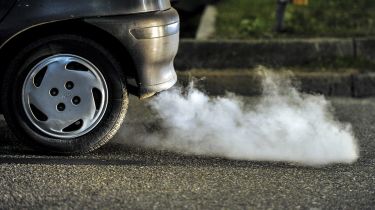
The phrase ‘carbon neutral’ is becoming increasingly prevalent as car companies clamour to prove the sustainability credentials of their latest models.
But what does ‘carbon neutral’ actually mean? What can manufacturers do to offset their carbon emissions? And can cars really be carbon neutral over a lifecycle? Keep reading as we answer these questions and more in this guide to car carbon footprints.
What are the average CO2 emissions produced by UK cars?
On average, a UK car produces 221.4 grams of CO2 a mile according to the latest figures recorded in 2020 – a bar you can compare your car against, although bear in mind that manufacturer figures are usually grams of CO2 per kilometre not per mile – and you can expect that figure to have dropped since those figures were compiled.
Per-car CO2 emissions have declined every year since 2001 thanks to the introduction of technology including small-capacity turbocharged engines, plug-in hybrids and EVs.
How do I calculate my car’s carbon footprints?
If you treated maths class as an opportunity to gaze out the window daydreaming of more interesting things, you might find calculating your car’s carbon footprint can be complicated. You need to convert miles to kilometres, gallons to litres and then base your calculation on the fact that a litre of petrol produces 2.39kg of CO2 for every litre burnt or 2.62kg of CO2s for diesels.
Thankfully, there are plenty of online tools that can crunch the numbers for you. All you need is your annual mileage, fuel economy in MPG and the fuel your car uses, and an online calculator can do the rest.
And it’ll come up with some eye-opening figures. Say you drive a 1.0-litre petrol Ford Fiesta 10,000 miles a year at the manufacturer’s quoted average fuel consumption of 58.9mpg – that’ll equate to 1,845kg of CO2 emissions emitted.
And in a thirstier car? A Porsche Cayenne Turbo fits that bill. Its fuel economy of 20.9mpg means its CO2 output tips the scales at a whopping 5,199kg over the same 10,000 miles.
What is a carbon offset?
Want to right the wrongs of your car’s CO2 emissions? Then it’s time to talk about carbon offsets. A carbon offset allows you to compensate for your CO2 emissions by funding a project that reduces emissions elsewhere. You may use your carbon offset to compensate for things like your energy emissions or flying, but the same principle can also be used for your car.
How do I offset my car’s emissions?
As you can imagine, offsetting car (or any) emissions is becoming big business – as we get more aware of our own impact on the environment, more of us want to do something to reverse it.
Various companies offer this service. They allow you to calculate your car’s (or all your) CO2 emissions and then pay to offset them – your money goes towards schemes like tree planting (trees convert CO2 to oxygen) and renewable energy sources that reduce the need for CO2-producing power stations.

So how does it work? Well, you choose your company, input your CO2 emission details into its online calculator and then you’ll be given a variety of options on how to offset your CO2s. They cover everything you can imagine – from planting trees in Kenya to building solar panels in the UK and providing more efficient cooking stoves in Nicaragua – you just choose the most compelling scheme for you or your wallet.
How do manufacturers offset carbon emissions to make claims that their cars are carbon neutral?
Carmakers can offset their carbon footprint in the same way individuals can, only at a much larger scale.
Land Rover has been commended for its carbon neutrality by investing in energy-saving projects such as solar panels and LED lighting for its premises. As a result, its operating CO2 emissions are down 74 per cent (from 2007) and the energy used to build a vehicle has been reduced by 37 per cent.
Does carbon offsetting work?
Carbon offsetting does work – but it’s only counted as effective if the CO2 emissions are reduced more than they would have been without it. Different types of carbon offsetting can be more or less useful, though.
For example, building a wind farm is a very effective way of reducing CO2 emissions because every watt of power produced by wind is potentially a watt of power that hasn’t been produced by burning fossil fuels. Tree planting, however, can be less effective; if all goes to plan, great, but a forest fire could wipe out all your CO2 offsetting at a stroke.
What are carbon credits?
Carbon credits are earned when a carmaker builds a car that produces less than 50g/km of CO2 – such a car counts as 1.33 cars fitted with an internal combustion engine. Or, to put it another way, the sales of three ultra-low emission cars will effectively be the equivalent of four normal cars sold.
The more low-emitting cars a manufacturer sells, the more credits it earns – these can then be used to offset the extra CO2 emissions produced by the manufacturer’s higher-polluting models. Or traded with other manufacturers who need to lower their fleet’s average CO2 emission but don’t sell the low-polluting cars to do it.
What happens if a company misses its CO2 target? Things get expensive… A company will be penalised £86 for every g/km it goes over its annual CO2 target, multiply that by the number of vehicles sold that year and you could be looking at a very hefty fine.
The limitations of carbon credits? They only take account of a car’s tailpipe emissions, not the CO2 released when a car is built or disposed of.
Can cars be carbon-neutral?
Cars can be carbon-neutral to a point. Electric cars are technically carbon neutral because they produce no localised CO2 in the form of exhaust emissions. Having said that, the electricity they use could have been produced at a power station that does produce CO2. On top of that, you also have to consider the CO2 emissions released during a car’s production and disposal – which will account for the majority of the CO2 produced during its lifetime.
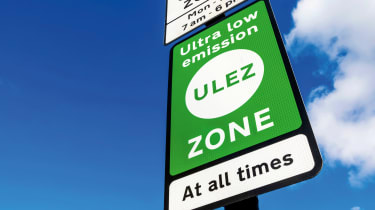
Another way of looking at it is that any car can be carbon neutral if you’re willing to spend money offsetting its CO2 emissions as discussed above.
How much CO2 is emitted during a car’s production?
Lots of CO2 is emitted during the process that sees raw materials transformed into a finished, driving car – you don’t just have to factor in the energy used building the car, but also the CO2 emitted producing and transporting the raw materials to get you to that point.
Experts estimate building a car like the Volkswagen up! emits 6 tonnes of CO2 into the atmosphere, while a midsize car like a BMW 3 Series will be closer to 17 tonnes and a big SUV in the shape of a Land Rover Discovery will release up to 35 tonnes.
On a brighter note, the CO2 released during a car's production dropped by more than a quarter on average between 2006 and 2021.
Can cars really be carbon neutral over a lifecycle?
Can cars be carbon neutral over a lifecycle? The short answer is no, not yet, however EV brand Polestar aims to produce the first carbon-neutral or climate-neutral car by 2030 as part of its Polestar 0 project.
How? By working with its partners and suppliers to remove greenhouse gas emissions from the supply chain.
Polestar admits: “We’ll have to rethink almost everything we already know about making cars. From innovative design to circular batteries. From recycled materials to renewable energy throughout the supply chain. The results of this mission will not only benefit the Polestar 0 project but help contribute to other aspects of society.”
Other manufacturers have also taken steps to reduce the emissions released during a car’s use and construction. BMW iX and i4 electric cars are built using clean hydroelectric power, while Mercedes plans to use green steel – manufactured without the use of fossil fuels – to build cars by 2025. Nissan and Volkswagen meanwhile, aim to be carbon neutral by 2050.
Looking for a car that produces no localised emissions? Read our list of the best electric cars on sale...



